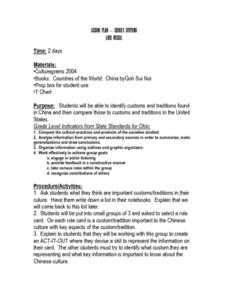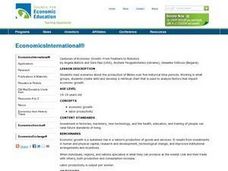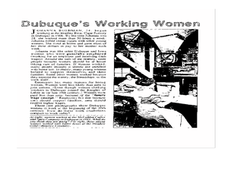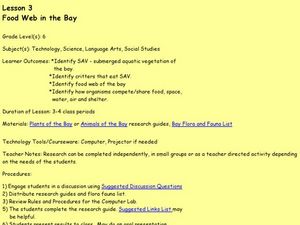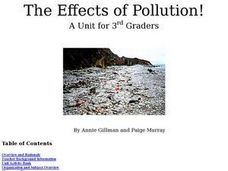Curated OER
Understand the Push Pull Theory of Immigration
Students examine the Push Pull Theory of immigration. In this instructional activity on immigration, students explore primary sources to discover several reasons why people migrate. They will then present skits to share this information....
Curated OER
China's Customs
Students discuss important customs and traditions in their cultures, examine Chinese customs and traditions, and work in groups to create skits about Chinese customs and culture.
Curated OER
Family Newscast
Students report on family trends, functions of the family and various ways of selecting marriage partners. In this family lesson plan, students act as editors, commercial skits, and writers for a newscast about families.
Curated OER
A New Deal for Peace in a Land of War
Students explore the causes and effects of recent conflicts in the Balkans, and discover the current peacekeeping attempts by NATO and the new Yugoslav government. They research an aspect of the Kosovo conflict and prepare skits based...
Curated OER
Dramatic Dilemmas
In this activity, students will develop skits that deal with the following aspects of decision making: projecting possible long term impacts of a decision and taking risks.
Curated OER
Fighting Fire With Satire
Students consider satire in the news by exploring various sources of "fake news," and then creating their own political satire in the form of a skit, news article, or cartoon.
Curated OER
Centuries of Economic Growth: From Feathers to Robotics
Students read scenarios about the production of Bibles over five historical time periods. Working in small groups, students create skits and develop a retrieval chart that is used to analyze factors that impact economic growth.
Curated OER
Would You Stick Your Neck Out?
Students examine personal qualities of individuals who have been able to help others through selfless actions, and develop short skits about heroes who have stuck their necks out to help others.
Curated OER
A More Perfect Union
Fourth graders complete a unit of lessons on the development of the U.S. government. They examine the main ideas of the Declaration of Independence, develop a class translation of the preamble to the Constitution, create a flow chart,...
Curated OER
Let the Music Play
Students create auditory presentations on festivals and celebrations around the world. They begin by reading about how the New Orleans high school marching bands have overcome many obstacles to keep their music traditions alive. Then...
Curated OER
The Vikings of Scandinavia
Students become familiar with who the Vikings were and what they accomplished. In this Vikings lesson, students locate the Scandinavian countries. Students will record information about the Vikings in a Viking notebook. Students will...
Curated OER
Badges of Pride
Fifth graders investigate jobs and how people identify with their job. In this labor instructional activity, 5th graders create a book from illustrations of various jobs. Students read an article about labor and answer questions about...
Curated OER
Paint's Family Tree
Students sort and classify the genetic traits of horses. In this heredity and genetics lesson, students read dialogue in a skit in which specific physical traits of several horses are described and a horse family tree is created....
Overcoming Obstacles
Listening Responsibly
Responsible speaker + critical listener = effective communication is the equation at the heart of a responsible listening instructional activity about the power of words. Class members view the clip of the courtroom scene from the film A...
University Interscholastic League
English Lesson to Prepare for UIL Spelling and Vocabulary Contest
"i before e. . ." Spelling is easier if kids know the eight basic spelling rules contained in this resource packet.
Curated OER
Why Can’t I Have Sugar? All About Diabetes
Begin the lesson by having your class write what they know about diabetes. They learn through a skit how the body metabolizes glucose. A visual representation of the two types of diabetes is displayed, and then learners participate in...
Curated OER
Food Web in the Bay
Sixth graders study the food web in a bay. In this food web lesson, 6th graders investigate the SAV- submerged aquatic vegetation of a bay including their predators, and how the organisms eat, have proper living space and water. They...
Curated OER
The Effects of Pollution!
Learners examine pollution and how it affects the environment. They discuss how human activities lead to more pollution. They talk about the importance of recycling. There is a skit, resource links, and activities provided to make this a...
Learn NC
Buffalo Soldiers
"Stolen from Africa, brought to America,/Fighting on arrival, fighting for survival." Bob Marley's "Buffalo Soldiers" provides high schoolers an opportunity to explore the rich history of the Rastafarians in Jamaica and the Buffalo...
Alabama Learning Exchange
Good Litter, Bad Litter
Which ones can be thrown on the ground? Discover the difference between natural litter and unhealthy trash, helping scholars by using several examples. Use the information here to give them a basic background, but also encourage prior...
Curated OER
The Green Truck Garden Giveaway
Young scholars read "The Green Truck Garden Giveaway" and explore the hobby of gardening. After observing illustrations in the book, students predict possible events in the story. They discuss gardening and write a story about a...
Curated OER
Drug and Alcohol Awareness
Fourth graders examine the statistics when it comes to teens and drug and alcohol abuse. In groups, they research the side effects of four different drugs. Using the information, they perform a skit, or puppet show to share their data...
Curated OER
Can We Live Without Paper?
Learners create a story, skit, or storyboard to express their thoughts on a world without paper. For this paper lesson plan, learners learn how their lives would be affected if we didn't have paper.
Curated OER
On With the Show!
Students think about comedy skits, based on family or domestic situations, and stage one of their own.



